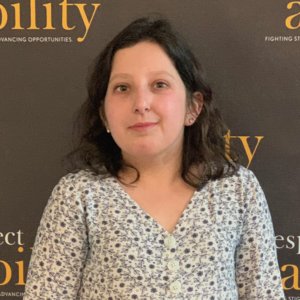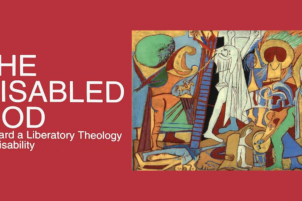Erdenheim, Pa., Mar. 27 – As I sit in my childhood home outside of Philadelphia in the midst of the COVID-19 pandemic, now almost two weeks after having been uprooted from my “new” life I was starting in DC, it seems only natural that my mind should wander to happier, “easier” times – many of which only happened one month ago. Four weeks ago, COVID-19 was just coming on our radar, having had only just jumped from the international pages to the bottom of the front page. My mind was elsewhere – primarily focused on Jewish disability advocacy.
It’s strange to think that, right now, I’m working in a field that, only a few short years ago, I had absolutely no idea existed.
Before coming to school at American University (AU), I had never heard of Jewish Disability Advocacy, Awareness and Inclusion Month (JDAIM), or even realized that there was such a strong community of Jews with disabilities. It wasn’t until late in 2016, when the former engagement director of AU’s Hillel sent me an email invitation to the upcoming Jewish Disability Advocacy Day (JDAD) that I even became aware of this world.
Needless to say, I jumped in headfirst.
Growing up, I always had felt strongly about my identity as a Jew, but I had never quite embraced – or even been clear on – my identity as a disabled person. I was born with a rare genetic disorder, called Neurofibromatosis (NF) type 1: NF primarily causes tumors to grow anywhere on or in the body, but also can cause a variety of other complications. At age two-and-a-half, I was diagnosed with a type of brain tumor, and entered into chemotherapy. From then until age 11, I was in and out of treatment.
It wasn’t until I was 12 that I really started to embrace my illness-identity. That year, I went to a summer camp for people with my genetic disorder and was a featured interviewee in a promotional video for the camp. After having met people who could relate to my same experiences, it made me feel comfortable enough to start sharing my own more openly. For the first time ever, I felt okay telling people about my NF – what it meant and how it affected me. As an aside, I can only imagine what my camp director, and all summer camps and their directors, are doing – or undoing – in the wake of COVID-19.
I’ve come a long way since that video made at summer camp; I’ve learned a lot more about disability advocacy and my own identity. I’ve heard advocacy experts explain policy issues on a personal level and gained from them the knowledge and skills for how to promote change. I’ve been introduced to the Jewish perspective on disability – to how the ideas of tikkun olam and tzedakah play a role in creating a more accessible society.
I also have come to understand a lot more about myself and where I stand in both the Jewish and disability communities, and how it is to be uniquely positioned at the crossroads of the two. Just as my disability has made me a more faithful person, my faith has made me a better disability advocate.
During the fall semester of my junior year at college, I dealt with some pretty major NF-related health issues. After having been “okay” for so long, it was difficult for me to adjust to these changes – especially given that I was in school and away from my family. But I was also very fortunate as, this time, I had all of my advocacy resources and experiences to draw from: I had peers who could relate, as college students dealing with health issues. I could draw strength from my faith to lessen the challenges I was facing. I used my advocacy skills to ask for the support that I was hesitant to admit I needed, but did, from professors and administrators. I was able to finally feel comfortable admitting that I was sick, and that I was not going to “get better soon” as many sweet but misinformed well-wishers hoped for me. It was easier this time around – and that experience taught me that, while I hope I won’t have to deal with anything else any time soon, it will be even easier next time.
Yet it is because of all of this that doing this work matters so much to me. I want to help other Jews with disabilities – and nondisabled Jews and disabled non-Jews and really everyone – to find the strength that the intersection of their identities can provide to them and their causes. When we find the communities that we fit into that share our passions, we find strength and the place we belong.
In our Jewish Disability Perspectives newsletter, RespectAbility welcomes a wide spectrum of voices. The views expressed in each Jewish Disability Perspectives contribution are those of the guest contributor.








